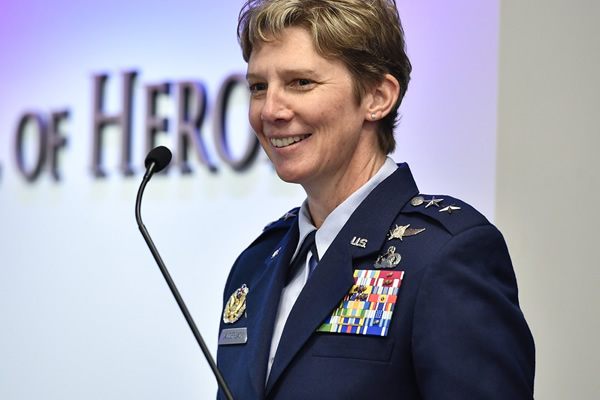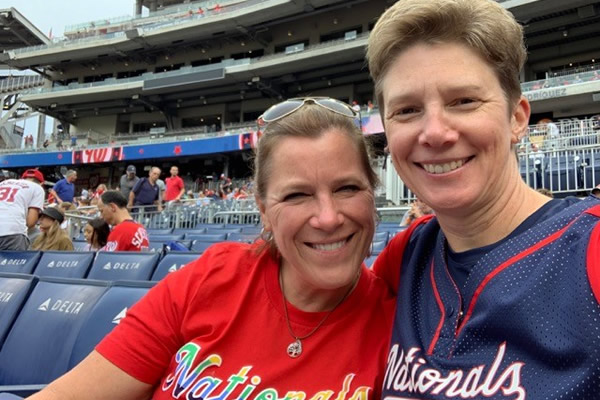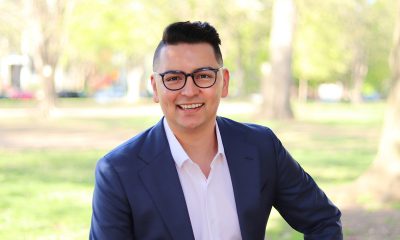National
From surviving ‘Don’t Ask’ to Space Force: An epic journey for Gen. Lauderback
Lesbian flag officer manages intel for newly minted service

You might not know it, but there’s a role for the U.S. Space Force in Afghanistan.
It could well be one of the many topics Maj. Gen. Leah Lauderback, director of intelligence, surveillance and reconnaissance for Space Force, is briefed on each morning when she comes into her office at the Pentagon.
Lauderback, speaking last week with the Washington Blade, said that speaks to the role of the newly minted service as primarily a “space-enabling capability.”
“You can’t do anything with your iPhone as an example, with your computer, with the GPS in your car without those space-enabling capabilities,” Lauderback said. “And so that truly is our role in Afghanistan, to support the United States contingent that is there today, and that’s through our GPS capabilities or communications capabilities.”
Lauderback assumed the role as head of the office overseeing intelligence for Space Force last year shortly after the previous administration created it. With a record of intelligence-gathering roles in her three decades of serving in the Air Force, the sister service to Space Force, Lauderback is a natural fit for the crucial position in the new service.
Still technically serving in the Air Force, Lauderback said she intends to leave the role next summer for a Guardian (the term bestowed to service members in the Space Force), and was chosen for the current role because she was a senior intelligence officer at the U.S. Space Command. Lauderback, nonetheless, said she was eager to take on those duties for a new service because she found the work “fascinating.”
“There is a lot of activity that is happening on orbit, and it’s not all good activity, right?” she said. “There are threats that present themselves almost on a daily basis. And so we were very busy, one, standing up to command at that time but then doing operational missions on a daily basis to compete with other near-peer competitors out there as well as to mitigate areas where we were in trouble from a threat perspective.”
One example Lauderback identified as a recent achievement came last year when a Russian satellite got very close to a U.S. satellite, and Gen. John Raymond, now commanding officer of U.S. Space Force, was able to push out into the media that the United States was concerned it was a Russian weapons system. The incident, Lauderback said, demonstrated U.S. capability to “call out the bad behavior and unprofessional behavior we thought of Russia.”
For an openly gay woman like Lauderback, the role as head of intelligence for a U.S. service holds special significance. Such a position would have been out of reach for an openly gay person in years past, when more LGBTQ people were closeted and the pervasive view was employing them in intelligence roles would be a national security threat if they were blackmailed.
Lauderback, who served when the military asked applicants whether or not they were homosexual and barred those who responded “yes,” recognizes the importance of an openly gay woman now heading up an entire office of intelligence for a U.S. military service.
“It’s really very significant that the fact that I can be out means that nobody can hold this over my head and I can serve openly and be the best intelligence officer that I could possibly be,” she said.
But it took a while to get there. Lauderback graduated from college in 1993, when “Don’t Ask, Don’t Tell” became the law of the land, and has had assignments in the military since that time as she continued to pursue advanced degrees. Under that law, Lauderback had to keep quiet about being a lesbian or risk being discharged.
“Certainly, when I first came out — and I was really enjoying my job, and I wanted to make the Air Force a career — but every day it was a concern, and absolutely made me untruthful at times, which is so embarrassing to say and humiliating at this point,” Lauderback said. “I had to lie at times. I was still hidden as a gay member in the service, but I trudged through that.”
Lauderback said during the years under “Don’t Ask, Don’t Tell” she became “less and less paranoid” and was able to find a friend at every base where she was stationed that she could trust with the truth about her sexual orientation. Those friends, she said, supported her on base and when she went on deployment.
Things changed in September 2011. After former President Obama signed “Don’t Ask, Don’t Tell” repeal, the U.S. military certified it was ready to allow openly gay people in its ranks. The long ban was over and Lauderback was no longer forced to keep being gay a secret.
“I, like many others I’m sure, wept a little bit,” she said. “We had the conversations with friends about how different this was going to be, and it was very different. Immediately I felt the weight off my shoulders, immediately I knew that I had recourse if I felt that I was going to be discriminated against at any point in time, I felt that I knew I could go and make a complaint about things.”
Since that time, Lauderback married her spouse, Brenda Hall. The two have been happily married for years, Lauderback said.

But nearly 10 years since “Don’t Ask, Don’t Tell” was lifted, and shortly after transgender service members were allowed to begin service after President Biden reversed the previous administration’s ban, Lauderback said issues for LGBTQ service members remain and many gay service members are still afraid to come out.
For that reason, Lauderback in March helped set up the LGBTQ Initiatives Team for the Air Force and Space Force, one of the barrier-analysis working groups ordered by senior leadership. Five months later, Lauderback said the task force continues to have conversations with leadership about policies, such as wording and terminology, that make people feel unwelcome in service.
“This barrier-analysis working group is really kind of grassroots,” Lauderback said. “While there are a few of us that are of higher rank on the team, it is mostly made up of folks that are much younger, have very different experiences than we do. And so, they are uncovering what are those barriers, those unconscious biases that folks have … and identifying those areas that we can start knocking out.”
One example of a change Lauderback said the team would “love to see” is the use of pronouns in some of the signature blocks in communications from service members.
“It is well known and well practiced outside of the military in the public sphere, but within the government, I don’t think anybody’s actually brought it up to the senior leadership,” Lauderback said. “If you could use a pronoun, and especially if it’s for transgender members, it could be for women, it could be for somebody who doesn’t have a Westernized name, it was really nice to be able to say, you know, in my signature block ‘she, her, hers.’”
Lauderback said her team is working through that change and thinks “we’ll be successful at some point.”
Meanwhile, Lauderback continues to wear her main hat as head of intelligence for Space Force, for which she manages the delivery of intelligence to the secretary of the Air Force and the chief of space operations and ensures analysts are adhering to the framework for rules in gathering intelligence.
“There’s just a lot of two steps forward, one step back type of potential, where you need to have facility space or you need to have — if it’s IT equipment and things like that,” she said. “And you have to hire people. So, we’re still making all of that happen in our directorate and across the entire enterprise, but I think we’re in a really good position, and certainly for the Space Force as it continues to mature, continues to grow.”
Space is made up of, well, mostly empty space, as any scientist will tell you. However, that adage is becoming incrementally less true as entrepreneurs, such as Elon Musk, continue to launch private satellites into orbit in numbers that could surpass the nearly 2,000 belonging to the United States. Starlink, the SpaceX program that manages its satellites, has 300 satellites in orbit — and has signaled plans for an eventual goal to deploy a total of 30,000 or more.
Lauderback, asked if that was a threat or should be welcomed, downplayed any concern of private companies surpassing U.S. government presence in space, saying the entrepreneurial endeavors would lower overall costs for launching satellites.
“It’s very much something to be welcomed, and we see it as a positive,” Lauderback said. “And I know Gen. Raymond as the CSO has remarked on this a number of times. What happens when you have commercial entities like this one, they’re able to operate sometimes at a much faster pace than we can in the government, so we want to be able to take advantage of that and then secondly, they truly drive the price point down for us.”
Launching astronauts into space remains an exciting event, including the prospect of sending the next human spaceflight to the Moon, and the first-ever landing on Mars. Lauderback, however, said she couldn’t comment directly because those projects are part of NASA’s domain.
“I would say, from my perspective as an intelligence officer,” Lauderback said, “when there is more exploration in space, as there has been on every other domain — the air domain or land domain or the maritime domain — the Department of Defense needs to be prepared to protect and defend our capabilities … so as an intelligence officer that’s really part of my job is to watch what it is that other countries might be doing or what their desires and their intentions are.”
While transporting human beings to other worlds continues to be an aspiration, questions have arisen recently about whether other worlds are sending living beings to Earth amid new interest in government reports on UFOs. U.S. intelligence over the summer revealed 140 sightings by American military pilots between 2004 and 2021 — and the Pentagon has no idea what they’re seeing.
Lauderback, asked what she makes of the findings given her position as head of space intelligence, declined to comment directly on what she makes of the phenomena, citing an ongoing study in other military services, although she quibbled with the use of the term “UFOs” to describe them.
“I would say it’s not UFOs, but it’s unidentified aerial phenomena,” Lauderback said. “So I key in on the term aerial in that case. I’ll leave it to the folks that are operating in the air domain and we’re working in the space domain, so I think that’s about all that I would be able to tell you.”
Luke Schleusener, president of Out of National Security, an affinity group for LGBTQ staffers in national security, said the absence of any backlash to an out lesbian in Lauderback’s position “tells us how far much of the country has come in the decade since the repeal of DADT.”
“She’ll bring her whole self to work,” Schleusener said. “At a time of ‘resurgent great power competition,’ having diverse teams and diverse leaders will make the Space Force more effective. It’s also a matter of our government and our military best serving the nation when our public servants and service members reflect those they’re sworn to serve, at all levels.”

Federal Government
HHS to retire 988 crisis lifeline for LGBTQ youth
Trevor Project warns the move will ‘put their lives at risk’

The U.S. Department of Health and Human Services is planning to retire the national 988 crisis lifeline for LGBTQ youth on Oct. 1, according to a preliminary budget document obtained by the Washington Post.
Introduced during the Biden-Harris administration in 2022, the hotline connects callers with counselors who are trained to work with this population, who are four times likelier to attempt suicide than their cisgender or heterosexual counterparts.
“Suicide prevention is about risk, not identity,” said Jaymes Black, CEO of the Trevor Project, which provides emergency crisis support for LGBTQ youth and has contracted with HHS to take calls routed through 988.
“Ending the 988 Suicide and Crisis Lifeline’s LGBTQ+ youth specialized services will not just strip away access from millions of LGBTQ+ kids and teens — it will put their lives at risk,” they said in a statement. “These programs were implemented to address a proven, unprecedented, and ongoing mental health crisis among our nation’s young people with strong bipartisan support in Congress and signed into law by President Trump himself.”
“I want to be clear to all LGBTQ+ young people: This news, while upsetting, is not final,” Black said. “And regardless of federal funding shifts, the Trevor Project remains available 24/7 for anyone who needs us, just as we always have.”
The service for LGBTQ youth has received 1.3 million calls, texts, or chats since its debut, with an average of 2,100 contacts per day in February.
“I worry deeply that we will see more LGBTQ young people reach a crisis state and not have anyone there to help them through that,” said Janson Wu, director of advocacy and government affairs at the Trevor Project. “I worry that LGBTQ young people will reach out to 988 and not receive a compassionate and welcoming voice on the other end — and that will only deepen their crisis.”
Under Trump’s HHS secretary, Robert F. Kennedy, Jr., the agency’s departments and divisions have experienced drastic cuts, with a planned reduction in force of 20,000 full-time employees. The Substance Abuse and Mental Health Services Administration has been sunset and mental health services consolidated into the newly formed Administration for a Healthy America.
The budget document reveals, per Mother Jones, “further sweeping cuts to HHS, including a 40 percent budget cut to the National Institutes of Health; elimination of funding for Head Start, the early childhood education program for low-income families; and a 44 percent funding cut to the Centers for Disease Control, including all the agency’s chronic disease programs.”
U.S. Supreme Court
Supreme Court hears oral arguments in LGBTQ education case
Mahmoud v. Taylor plaintiffs argue for right to opt-out of LGBTQ inclusive lessons

The U.S. Supreme Court on Tuesday heard oral arguments in Mahmoud v. Taylor, a case about whether Montgomery County, Md., public schools violated the First Amendment rights of parents by not providing them an opportunity to opt their children out of reading storybooks that were part of an LGBTQ-inclusive literacy curriculum.
The school district voted in early 2022 to allow books featuring LGBTQ characters in elementary school language arts classes. When the county announced that parents would not be able to excuse their kids from these lessons, they sued on the grounds that their freedom to exercise the teachings of their Muslim, Jewish, and Christian faiths had been infringed.
The lower federal courts declined to compel the district to temporarily provide advance notice and an opportunity to opt-out of the LGBTQ inclusive curricula, and the 4th U.S. Circuit Court of Appeals determined that the parents had not shown that exposure to the storybooks compelled them to violate their religion.
“LGBTQ+ stories matter,” Human Rights Campaign President Kelley Robinson said in a statement Tuesday. “They matter so students can see themselves and their families in the books they read — so they can know they’re not alone. And they matter for all students who need to learn about the world around them and understand that while we may all be different, we all deserve to be valued and loved.”
She added, “All students lose when we limit what they can learn, what they can read, and what their teachers can say. The Supreme Court should reject this attempt to silence our educators and ban our stories.”
GLAD Law, NCLR, Family Equality, and COLAGE submitted a 40-page amicus brief on April 9, which argued the storybooks “fit squarely” within the district’s language arts curriculum, the petitioners challenging the materials incorrectly characterized them as “specialized curriculum,” and that their request for a “mandated notice-and-opt-out requirement” threatens “to sweep far more broadly.”
Lambda Legal, the Leadership Conference on Civil and Human Rights, PFLAG, and the National Women’s Law Center announced their submission of a 31-page amicus brief in a press release on April 11.
“All students benefit from a school climate that promotes acceptance and respect,” said Karen Loewy, senior counsel and director of constitutional law practice at Lambda Legal. “Ensuring that students can see themselves in the curriculum and learn about students who are different is critical for creating a positive school environment. This is particularly crucial for LGBTQ+ students and students with LGBTQ+ family members who already face unique challenges.”
The organizations’ brief cited extensive social science research pointing to the benefits of LGBTQ-inclusive instruction like “age-appropriate storybooks featuring diverse families and identities” benefits all students regardless of their identities.
Also weighing in with amici briefs on behalf of Montgomery County Public Schools were the National Education Association, the ACLU, and the American Psychological Association.
Those writing in support of the parents challenging the district’s policy included the Center for American Liberty, the Manhattan Institute, Parents Defending Education, the Alliance Defending Freedom, the Trump-Vance administration’s U.S. Department of Justice, and a coalition of Republican members of Congress.
U.S. Supreme Court
LGBTQ groups: SCOTUS case threatens coverage of preventative services beyond PrEP
Kennedy v. Braidwood oral arguments heard Monday

Following Monday’s oral arguments before the U.S. Supreme Court in Kennedy v. Braidwood Management, Inc., LGBTQ groups issued statements warning the case could imperil coverage for a broad swath of preventative services and medications beyond PrEP, which is used to reduce the risk of transmitting HIV through sex.
Plaintiffs brought the case to challenge a requirement that insurers and group health plans cover the drug regimen, arguing that the mandate “encourage[s] homosexual behavior, intravenous drug use, and sexual activity outside of marriage between one man and one woman.”
The case has been broadened, however, such that cancer screenings, heart disease medications, medications for infants, and several other preventive care services are in jeopardy, according to a press release that GLAAD, Lambda Legal, PrEP4All, Harvard Law’s Center for Health Law and Policy Innovation (CHLPI), and the Center for HIV Law and Policy (CHLP) released on Monday.
The Trump-Vance administration has argued the independent task force responsible for recommending which preventative services must be covered with no cost-sharing for patients is constitutional because the secretary of the U.S. Department of Health and Human Services can exercise veto power and fire members of the volunteer panel of national experts in disease prevention and evidence-based medicine.
While HHS secretaries have not exercised these powers since the Affordable Care Act was passed in 2010, Braidwood could mean Trump’s health secretary, Robert F. Kennedy Jr., takes a leading role in determining which services are included in the coverage mandate.
Roll Call notes the Supreme Court case comes as the administration has suspended grants to organizations that provide care for and research HIV while the ongoing restructuring of HHS has raised questions about whether the “Ending the HIV Epidemic” begun under Trump’s first term will be continued.
“Today’s Supreme Court hearing in the Braidwood case is a pivotal moment for the health and rights of all Americans,” said GLAAD President Sarah Kate Ellis. “This case, rooted in discriminatory objections to medical necessities like PrEP, can undermine efforts to end the HIV epidemic and also jeopardize access to essential services like cancer screenings and heart disease medications, disproportionately affecting LGBTQ people and communities of color.”
She added, “Religious exemptions should not be weaponized to erode healthcare protections and restrict medically necessary, life-saving preventative healthcare for every American.”
Lambda Legal HIV Project Director Jose Abrigo said, “The Braidwood case is about whether science or politics will guide our nation’s public health policy. Allowing ideological or religious objections to override scientific consensus would set a dangerous precedent. Although this case began with an attack on PrEP coverage, a critical HIV prevention tool, it would be a serious mistake to think this only affects LGBTQ people.”
“The real target is one of the pillars of the Affordable Care Act: The preventive services protections,” Abrigo said. “That includes cancer screenings, heart disease prevention, diabetes testing, and more. If the plaintiffs succeed, the consequences will be felt across every community in this country, by anyone who relies on preventive care to stay healthy.”
He continued, “What’s at stake is whether we will uphold the promise of affordable and accessible health care for all or allow a small group of ideologues to dismantle it for everyone. We as a country are only as healthy as our neighbors and an attack on one group’s rights is an attack on all.”
PrEP4All Executive Director Jeremiah Johnson said, “We are hopeful that the justices will maintain ACA protections for PrEP and other preventive services, however, advocates are poised to fight for access no matter the outcome.”
He continued, “Implementing cost-sharing would have an enormous impact on all Americans, including LGBTQ+ individuals. Over 150 million people could suddenly find themselves having to dig deep into already strained household budgets to pay for care that they had previously received for free. Even small amounts of cost sharing lead to drops in access to preventive services.”
“For PrEP, just a $10 increase in the cost of medication doubled PrEP abandonment rates in a 2024 modeling study,” Johnson said. “Loss of PrEP access would be devastating with so much recent progress in reining in new HIV infections in the U.S. This would also be a particularly disappointing time to lose comprehensive coverage for PrEP with a once every six month injectable version set to be approved this summer.”
“Today’s oral arguments in the Braidwood case underscore what is at stake for the health and well-being of millions of Americans,” said CHLPI Clinical Fellow Anu Dairkee. “This case is not just about legal technicalities — it is about whether people across the country will continue to have access to the preventive health services they need, without cost sharing, regardless of who they are or where they come from.”
She continued, “Since the Affordable Care Act’s preventive services provision took effect in 2010, Americans have benefited from a dramatic increase in the use of services that detect disease early, promote healthy living, and reduce long-term health costs. These benefits are rooted in the work of leading scientists and public health experts, including the U.S. Preventive Services Task Force, whose recommendations are based on rigorous, peer-reviewed evidence.”
“Any shift away from cost-free access to preventive care could have wide-ranging implications, potentially limiting access for those who are already navigating economic hardship and health disparities,” Dairkee said. “If Braidwood prevails, the consequences will be felt nationwide. We risk losing access to lifesaving screenings and preventive treatments that have become standard care over the past decade.”
“This case should serve as a wake-up call: Science, not politics, must guide our health care system,” she said. “The health of our nation depends on it.”
“We are grateful for the Justices who steadfastly centered constitutionality and didn’t allow a deadly political agenda to deter them from their job at hand,” said CHLP Staff Attorney Kae Greenberg. “While we won’t know the final decision until June, what we do know now is not having access to a full range of preventative healthcare is deadly for all of us, especially those who live at the intersections of racial, gender and economic injustice.”
“We are crystal clear how the efforts to undermine the ACA, of which this is a very clear attempt, fit part and parcel into an overall agenda to rollback so much of the ways our communities access dignity and justice,” he said. “Although the plaintiffs’ arguments today were cloaked in esoteric legal language, at it’s heart, this case revolves around the Christian Right’s objection to ‘supporting’ those who they do not agree with, and is simply going to result in people dying who would otherwise have lived long lives.”
“This is why CHLP is invested and continues in advocacy with our partners, many of whom are included here,” Greenberg said.

















